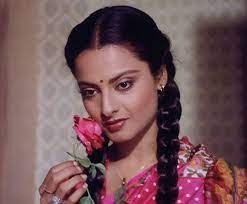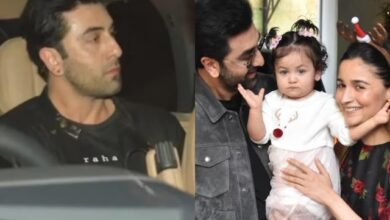The Impact of Rekha’s Pigtails on Bollywood Fashion
In terms of storyline and attire, Bollywood has always been a venue for innovation and evolution. In the 1970s, a young actress by the name of Rekha embarked on a journey that would profoundly alter the perception of fashion and beauty among Indian women as well as reinvent her career. One of her most recognizable performances was in the 1980 film “Khubsoorat,” when she chose to wear pigtails. She then wore the same style in the 1985 film “Jhoothi” by Hrishikesh Mukherjee. These pigtails were more than simply a haircut; they were a bold statement of female independence and a break from Bollywood’s accepted ideals of beauty.
Rekha, also known as Bhanurekha Ganesan, began her career in 1966 as a child artist before making her acting debut as the lead in the film “Sawan Bhadon” in 1970. She first embraced a traditional style that adhered to the norms prevalent in the industry. In her early years, she created an impact with her long, flowing hair, chic sarees, and quiet temperament. As her career progressed, Rekha started experimenting with her unique style and eventually became one of Bollywood’s most fashionable actors.
Rekha’s work in the film “Khubsoorat” is what changed her from a conventional Bollywood actress to a trailblazer. Hrishikesh Mukherjee’s film, which he also directed, dealt with the struggle between a family’s traditional beliefs and contemporary sensibilities. Manju Dayal, played by Rekha, was a colorful and free-spirited character that contrasted sharply with the characters she had previously performed.
Rekha’s appearance in “Khubsoorat” was most remarkable for the pigtails she wore. This decision was a notable break from the glamorous, painstakingly groomed hairdos that were fashionable at the time in Bollywood. Rekha’s pigtails were simple and unpretentious, yet they represented a departure from the constricting ideals of traditional beauty.
Rekha’s pigtails in “Khubsoorat” were more than simply a style choice; they also sent a powerful message of feminine empowerment. In the film, she played a character called Manju Dayal who was not afraid to embrace her uniqueness, defy society expectations, and be herself. Her choice of haircut acted as a symbolic representation of her liberation from social norms.
In a patriarchal country like India, where women were usually expected to adhere to conventional roles and notions of beauty, Rekha’s demeanor and her pigtails stood out as a sign of disobedience. Manju Dayal’s outspoken personality and eccentric looks inspired women throughout the country to defy and question conventional standards.
In addition to making an effect on the Indian public, Rekha’s pigtails in “Khubsoorat” inspired a new generation of actresses to embrace unique appearances that perfectly reflected the characteristics of their parts. Bollywood fashion saw a huge transformation as actors began to value character authenticity above conforming to idealized standards of beauty.
Five years after “Khubsoorat,” Hrishikesh Mukherjee’s “Jhoothi” (1985) was released, and Rekha donned the unmistakable pigtails once again. Pigtails were worn once again by her character, Devi, but in a different circumstance. In the film “Jhoothi,” Rekha played a mother who lied to protect her family. Rekha was able to utilize her looks to heighten the complexity of her role in this instance by wearing her hair in pigtails, which stood for innocence and vulnerability. This demonstrated her flexibility as an actor.
Rekha’s status as a fashion icon continues to have an impact on Bollywood and Indian fashion. Through her brave experimentation with dress, whether it was the pigtails in “Khubsoorat” or her subsequent penchant for Kanjeevaram sarees and dazzling jewelry, she distinguished herself as a trendsetter who was not afraid to disrupt the established order.
Rekha’s decision to wear pigtails in “Khubsoorat” and subsequently in “Jhoothi” altered the direction of Bollywood. It transcended the realm of fashion and came to stand for the emancipation and empowerment of women. Through these characters, Rekha strongly encouraged Indian women to resist conventional norms, appreciate their individuality, and be shamelessly honest.
Indian women and actors are still inspired by her reputation as a pioneer, a fashion icon, and a lady who fearlessly defied stereotypes today. Rekha’s pigtails will never simply be a hairdo in the history of Bollywood movies; they will also forever represent the spirit of femininity and the capacity for self-expression.







